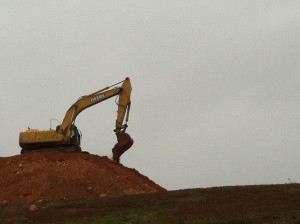By Shannon McGovern
Rockbridge County is once again fighting next year’s deadline to close the landfill in Buena Vista.
A letter from Gov. Bob McDonnell to county officials last month prompted County Administrator Robert Claytor to seek a temporary suspension of the state mandate that requires the closing of the landfill at the end of 2012 because it’s unlined, or lacks a plastic sheet on its bottom.
By a 4-to-1 vote, the board of supervisors adopted a resolution Monday asking for the suspension.
Virginia law allows the governor to temporarily suspend state mandates if he finds that a locality “faces fiscal stress” and the relief “would help alleviate the fiscal hardship.” McDonnell has until July 1 to enact a mandate suspension, which could last up to two years.
Nearly two dozen county officials met in Moody Hall at the Virginia Military Institute Nov. 9, Sen. Creigh Deeds, a Bath County Democrat, offered to look at the county’s proposal and draft legislation if the governor does not grant a temporary suspension of the mandate.
But Deeds says he is apprehensive about legislation that would give the county an extension. In a Rockbridge Report Newsmaker interview Nov. 14, he said making an exception could set a precedent, leading other jurisdictions to seek deadline extensions on landfills.
Deeds said he has to consider the well-being of the state as a whole as well as the localities he represents.
The state senator said he would not be surprised if the cities of Lexington and Buena Vista were upset if the county received an extension. They both signed expensive, 10-year contracts with Rockbridge Resource Recovery Inc. last year. RRR has begun construction on a transfer station that both cities will use.
Claytor says he feels confident in the county’s proposal because it meets the “fiscal stress” requirement. Transferring solid waste will cost the county $1 million to $1.3 million a year for hauling the trash and for the designated landfill’s receiving fees.
He says the county is hurting because of the planned renovation of Maury River Middle School and the mandated update of the wastewater treatment facility shared by the county and Lexington.
The county also must cover the expense of closing the landfill. Claytor said the county has been saving for this task, which will cost $2.4 million. Half of the landfill has already been closed, and shutting down both parts will cost the county $4.5 million.
Once the landfill is closed, it must be monitored for 30 years, Claytor said. The staff already employed at the landfill will oversee the transition and will monitor retention ponds, fix leaks and keep the area clear of invasive species.
Claytor said the ultimate goal is to save money for the county and its taxpayers. The county does not want to ship trash to outside facilities except for recycling. He said a two-year extension would allow county officials to look at alternatives, including waste-to-energy solutions. The $1 million annual savings could potentially go toward building a lined landfill, he said.
Today landfills must be lined, meaning deep holes are dug in the ground and then lined with plastic sheets. The sheets collect liquid produced during the decay process, and divert it through pipes for treatment. This technology aims to keep pollutants from draining into water sources beneath the landfill.
The county’s landfill, built in the 1970s, is unlined, which is why it must close by 2012 or when it is full – whichever comes first.
The deadline is a year away, but Claytor estimates the landfill has another two to three years of space available at its current receiving rate, which was 38,000 tons last year.
The property was chosen because it is covered by several feet of red clay, and the Virginia Department of Environmental Quality has not found any problems with water pollution. The DEQ monitors wells around the landfill to ensure the water beneath the property, which flows into the South River a few miles away, is not contaminated.
The landfill property covers 318 acres, 60 of which are being used for trash. Claytor said the surrounding land acts as a buffer and ensures that the landfill has a minimal negative environmental impact.
Although the county began renovations in October to convert an existing building at the landfill into a transfer station, Claytor said, an extension on the deadline would not put the $720,000 construction cost to waste. The county would complete the project and the building would be used for office space and equipment storage, he said.
Claytor said suspending the deadline could create tensions with Lexington and Buena Vista. But he said his priority is doing what is best for the county.
“We’re not picking a fight with anybody,” he said. “What we’re doing is asking to have this relief because we have space available.”
Check out past Rockbridge Report stories concerning the landfill:
http://journalism.wlu.edu/rrarchive/10-21-2010/WATStrash.html
http://journalism.wlu.edu/rrarchive/02-17-2011/KENNtrash.html

